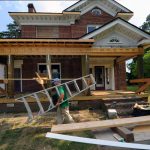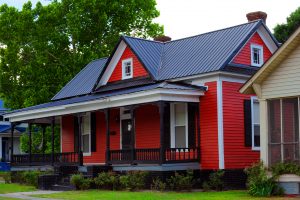|
|
Development Finance Initiative: Rebuilding North Carolina one town at a time – Southern CityBy CED Guest AuthorPublished March 10, 2015This article was originally published in the November/December edition of Southern City, as “Rebuilding North Carolina one town at a time.” It is reprinted here with permission. Towns across North Carolina are attracting investment and rejuvenating historic properties with the help of the University of North Carolina School of Government’s Development Finance Initiative (DFI). Michael Lemanski, who came to the program in 2012 as its inaugural executive director, took advantage of various finance tools to bring $250 million of investment to downtown Durham as a private real estate developer. Now, he’s helping other municipalities do the same. “I really like to see areas get transformed – trying to recreate the energy and excitement that used to exist downtown in historic buildings, in particular,” Lemanski said. The Initiative has been involved in 50 projects in 40 communities of all sizes, but most clients are rural towns without designated economic development staff. The program has 16 active projects ranging from downtown buildings to abandoned mills and distressed neighborhoods. “We take on challenging projects that the private sector can’t take on alone, so it is really rewarding to work on a project that the community has been trying to figure out how to redevelop for 20 or 30 years and help them turn a project that has potential into a project that can get completed,” he said. Most projects are long-term relationships where the Initiative and town staff work together to find the best opportunities for distressed properties. Lemanski said many people think it’s a matter of lacking capital to redevelop a property, but in reality it’s trying to find a compatible tenant. “It’s about the people that are going to occupy it and bring it to life that’s important to making a project successful,” Lemanski said. “To me, it’s really about trying to figure out the right opportunity to bring that energy and human interest back.” For instance, the Initiative is working on a project in downtown Wilmington to redevelop the Water Street Parking Deck, a complicated project that’s been under consideration to redevelop for 30 years. Instead of putting out a one-size-fits-all request for proposal, the city is going through a pre-development process to see how to best connect private industry interests with the public’s interest. Going through this process removes much of the risk for private investors because they have a clear vision of what the public wants and what the market can support. According to pre-development research, the public is interested in a mixed-use property with ground-floor retail space, two residential buildings and about 650 parking spaces when complete. “Private developers have taken this site on in the past 20 years and spent millions in pre-development only to get to the end to have the town say, ‘No, that’s not what we want.’ Eventually the private developers get exasperated and have to move on,” Lemanski said. “We’re saying, ‘Why don’t you tell the developers what you’re looking for and let them respond to that?’” While most of the projects are long term, cities and towns are also welcome to call the Initiative for quick answers to questions about legality, developing a proposal and investment strategies. For those that do require long-term assistance, the Initiative is a cost-effective option. Services are billed on a tiered-cost structure with distressed communities paying less, and the Initiative keeps costs low by using its fellows program to engage graduate students in the communities. “It’s been working out really well for the towns to feel like they have someone on their side of the table that knows the tricks of the trade and can evaluate these really complicated finance tools,” Lemanski said. Kinston: Cultivating a new arts and cultural district Development Finance Initiative is working with local residents, government, and other stakeholders to support private investment and revitalization in the Mitchelltown area, otherwise known as the recently christened Arts and Cultural District. Nestled between downtown and the Neuse River, this neighborhood suffered blight, high vacancy rates, and issues related to public safety and code enforcement over the past several decades. But the Arts and Cultural District also has many strategic advantages that complement Kinston’s burgeoning downtown scene — it is home to many historic and architecturally significant properties, its tree-lined streets are walkable to many local attractions, and its residents are committed to working towards neighborhood improvement. Furthermore, a community leader rehabilitated a number of once-vacant homes, such as the one shown in the photo, demonstrating the potential for this struggling yet promising area. The Initiative led a community-based effort to develop a neighborhood plan for the Arts and Cultural District by designating it an Urban Redevelopment Area. The designation opens up a host of economic development tools for local government to facilitate greater investment from the private sector. The Initiative also worked with local government staff to develop a new zoning overlay for this neighborhood that allows for live-work spaces in the Arts and Cultural District and restricts other uses that are not in line with goals identified by residents during the area planning process. Building on the new zoning overlay and the Urban Redevelopment Area designation, the city, Initiative and other stakeholders are working to establish an Artist Relocation Program to recruit new residents into the district’s vacant homes. Jessica Wells is Communications Specialist with the North Carolina League of Municipalities. |
Published March 10, 2015 By CED Guest Author
This article was originally published in the November/December edition of Southern City, as “Rebuilding North Carolina one town at a time.” It is reprinted here with permission.
Towns across North Carolina are attracting investment and rejuvenating historic properties with the help of the University of North Carolina School of Government’s Development Finance Initiative (DFI).
Michael Lemanski, who came to the program in 2012 as its inaugural executive director, took advantage of various finance tools to bring $250 million of investment to downtown Durham as a private real estate developer. Now, he’s helping other municipalities do the same.
“I really like to see areas get transformed – trying to recreate the energy and excitement that used to exist downtown in historic buildings, in particular,” Lemanski said.
The Initiative has been involved in 50 projects in 40 communities of all sizes, but most clients are rural towns without designated economic development staff. The program has 16 active projects ranging from downtown buildings to abandoned mills and distressed neighborhoods.
“We take on challenging projects that the private sector can’t take on alone, so it is really rewarding to work on a project that the community has been trying to figure out how to redevelop for 20 or 30 years and help them turn a project that has potential into a project that can get completed,” he said.
Most projects are long-term relationships where the Initiative and town staff work together to find the best opportunities for distressed properties. Lemanski said many people think it’s a matter of lacking capital to redevelop a property, but in reality it’s trying to find a compatible tenant.
“It’s about the people that are going to occupy it and bring it to life that’s important to making a project successful,” Lemanski said. “To me, it’s really about trying to figure out the right opportunity to bring that energy and human interest back.”
For instance, the Initiative is working on a project in downtown Wilmington to redevelop the Water Street Parking Deck, a complicated project that’s been under consideration to redevelop for 30 years. Instead of putting out a one-size-fits-all request for proposal, the city is going through a pre-development process to see how to best connect private industry interests with the public’s interest.
Going through this process removes much of the risk for private investors because they have a clear vision of what the public wants and what the market can support. According to pre-development research, the public is interested in a mixed-use property with ground-floor retail space, two residential buildings and about 650 parking spaces when complete.
“Private developers have taken this site on in the past 20 years and spent millions in pre-development only to get to the end to have the town say, ‘No, that’s not what we want.’ Eventually the private developers get exasperated and have to move on,” Lemanski said. “We’re saying, ‘Why don’t you tell the developers what you’re looking for and let them respond to that?’”
While most of the projects are long term, cities and towns are also welcome to call the Initiative for quick answers to questions about legality, developing a proposal and investment strategies. For those that do require long-term assistance, the Initiative is a cost-effective option. Services are billed on a tiered-cost structure with distressed communities paying less, and the Initiative keeps costs low by using its fellows program to engage graduate students in the communities.
“It’s been working out really well for the towns to feel like they have someone on their side of the table that knows the tricks of the trade and can evaluate these really complicated finance tools,” Lemanski said.
Kinston: Cultivating a new arts and cultural district
Development Finance Initiative is working with local residents, government, and other stakeholders to support private investment and revitalization in the Mitchelltown area, otherwise known as the recently christened Arts and Cultural District. Nestled between downtown and the Neuse River, this neighborhood suffered blight, high vacancy rates, and issues related to public safety and code enforcement over the past several decades. But the Arts and Cultural District also has many strategic advantages that complement Kinston’s burgeoning downtown scene — it is home to many historic and architecturally significant properties, its tree-lined streets are walkable to many local attractions, and its residents are committed to working towards neighborhood improvement. Furthermore, a community leader rehabilitated a number of once-vacant homes, such as the one shown in the photo, demonstrating the potential for this struggling yet promising area.
The Initiative led a community-based effort to develop a neighborhood plan for the Arts and Cultural District by designating it an Urban Redevelopment Area. The designation opens up a host of economic development tools for local government to facilitate greater investment from the private sector. The Initiative also worked with local government staff to develop a new zoning overlay for this neighborhood that allows for live-work spaces in the Arts and Cultural District and restricts other uses that are not in line with goals identified by residents during the area planning process. Building on the new zoning overlay and the Urban Redevelopment Area designation, the city, Initiative and other stakeholders are working to establish an Artist Relocation Program to recruit new residents into the district’s vacant homes.
Jessica Wells is Communications Specialist with the North Carolina League of Municipalities.
Author(s)
Tagged Under
This blog post is published and posted online by the School of Government to address issues of interest to government officials. This blog post is for educational and informational Copyright ©️ 2009 to present School of Government at the University of North Carolina. All rights reserved. use and may be used for those purposes without permission by providing acknowledgment of its source. Use of this blog post for commercial purposes is prohibited. To browse a complete catalog of School of Government publications, please visit the School’s website at www.sog.unc.edu or contact the Bookstore, School of Government, CB# 3330 Knapp-Sanders Building, UNC Chapel Hill, Chapel Hill, NC 27599-3330; e-mail sales@sog.unc.edu; telephone 919.966.4119; or fax 919.962.2707.



